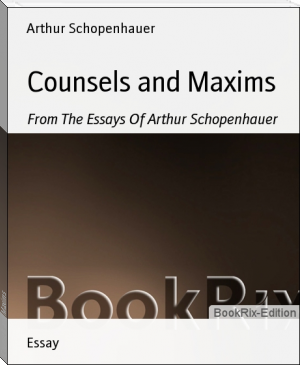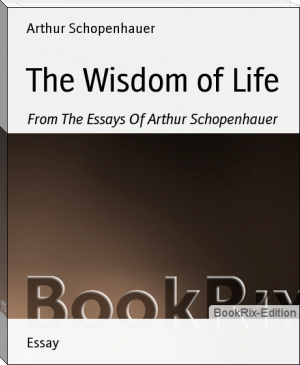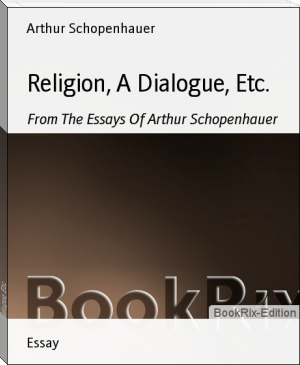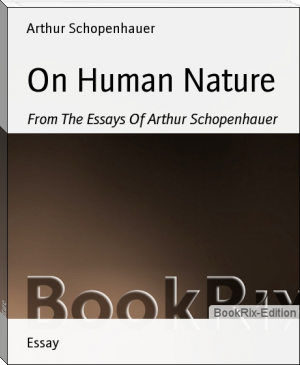Counsels and Maxims - Arthur Schopenhauer (dar e dil novel online reading TXT) 📗

- Author: Arthur Schopenhauer
Book online «Counsels and Maxims - Arthur Schopenhauer (dar e dil novel online reading TXT) 📗». Author Arthur Schopenhauer
- the fruit of a hot-house education, who surprise us by their cleverness as children, afterwards turn out very ordinary folk. Nay, the manner in which boys are forced into an early acquaintance with the ancient tongues may, perhaps, be to blame for the dullness and lack of judgment which distinguish so many learned persons.
[Footnote 1: Politics .]
I have said that almost every man's character seems to be specially suited to some one period of life, so that on reaching it the man is at his best. Some people are charming so long as they are young, and afterwards there is nothing attractive about them; others are vigorous and active in manhood, and then lose all the value they possess as they advance in years; many appear to best advantage in old age, when their character assumes a gentler tone, as becomes men who have seen the world and take life easily. This is often the case with the French.
This peculiarity must be due to the fact that the man's character has something in it akin to the qualities of youth or manhood or old age - something which accords with one or another of these periods of life, or perhaps acts as a corrective to its special failings.
The mariner observes the progress he makes only by the way in which objects on the coast fade away into the distance and apparently decrease in size. In the same way a man becomes conscious that he is advancing in years when he finds that people older than himself begin to seem young to him.
It has already been remarked that the older a man becomes, the fewer are the traces left in his mind by all that he sees, does or experiences, and the cause of this has been explained. There is thus a sense in which it may be said that it is only in youth that a man lives with a full degree of consciousness, and that he is only half alive when he is old. As the years advance, his consciousness of what goes on about him dwindles, and the things of life hurry by without making any impression upon him, just as none is made by a work of art seen for the thousandth time. A man does what his hand finds to do, and afterwards he does not know whether he has done it or not.
As life becomes more and more unconscious, the nearer it approaches the point at which all consciousness ceases, the course of time itself seems to increase in rapidity. In childhood all the things and circumstances of life are novel; and that is sufficient to awake us to the full consciousness of existence: hence, at that age, the day seems of such immense length. The same thing happens when we are traveling: one month seems longer then than four spent at home. Still, though time seems to last longer when we are young or on a journey, the sense of novelty does not prevent it from now and then in reality hanging heavily upon our hands under both these circumstances, at any rate more than is the case when we are old or staying at home. But the intellect gradually becomes so rubbed down and blunted by long habituation to such impressions that things have a constant tendency to produce less and less impression upon us as they pass by; and this makes time seem increasingly less important, and therefore shorter in duration: the hours of the boy are longer than the days of the old man. Accordingly, time goes faster and faster the longer we live, like a ball rolling down a hill. Or, to take another example: as in a revolving disc, the further a point lies from the centre, the more rapid is its rate of progression, so it is in the wheel of life; the further you stand from the beginning, the faster time moves for you. Hence it may be said that as far as concerns the immediate sensation that time makes upon our minds, the length of any given year is in direct proportion to the number of times it will divide our whole life: for instance, at the age of fifty the year appears to us only one-tenth as long as it did at the age of five.
This variation in the rate at which time appears to move, exercises a most decided influence upon the whole nature of our existence at every period of it. First of all, it causes childhood - even though it embrace only a span of fifteen years - to seem the longest period of life, and therefore the richest in reminiscences. Next, it brings it about that a man is apt to be bored just in proportion as he is young. Consider, for instance, that constant need of occupation - whether it is work or play - that is shown by children: if they come to an end of both work and play, a terrible feeling of boredom ensues. Even in youth people are by no means free from this tendency, and dread the hours when they have nothing to do. As manhood approaches, boredom disappears; and old men find the time too short when their days fly past them like arrows from a bow. Of course, I must be understood to speak of men , not of decrepit brutes . With this increased rapidity of time, boredom mostly passes away as we advance in life; and as the passions with all their attendant pain are then laid asleep, the burden of life is, on the whole, appreciably lighter in later years than in youth, provided, of course, that health remains. So it is that the period immediately preceding the weakness and troubles of old age, receives the name of a man's best years .
That may be a true appellation, in view of the comfortable feeling which those years bring; but for all that the years of youth, when our consciousness is lively and open to every sort of impression, have this privilege - that then the seeds are sown and the buds come forth; it is the springtime of the mind. Deep truths may be perceived, but can never be excogitated - that is to say, the first knowledge of them is immediate, called forth by some momentary impression. This knowledge is of such a kind as to be attainable only when the impressions are strong, lively and deep; and if we are to be acquainted with deep truths, everything depends upon a proper use of our early years. In later life, we may be better able to work upon other people, - upon the world, because our natures are then finished and rounded off, and no more a prey to fresh views; but then the world is less able to work upon us. These are the years of action and achievement; while youth is the time for forming fundamental conceptions, and laying down the ground-work of thought.
In youth it is the outward aspect of things that most engages us; while in age, thought or reflection is the predominating quality of the mind. Hence, youth is the time for poetry, and age is more inclined to philosophy. In practical affairs it is the same: a man shapes his resolutions in youth more by the impression that the outward world makes upon him; whereas, when he is old, it is thought that determines his actions. This is partly to be explained by the fact that it is only when a man is old that the results of outward observation are present in sufficient numbers to allow of their being classified according to the ideas they represent, - a process which in its turn causes those ideas to be more fully understood in all their bearings, and the exact value and amount of trust to be placed in them, fixed and determined; while at the same time he has grown accustomed to the impressions produced by the various phenomena of life, and their effects on him are no longer what they were. Contrarily, in youth, the impressions that things make, that is to say, the outward aspects of life, are so overpoweringly strong, especially in the case of people of lively and imaginative disposition, that they view the world like a picture; and their chief concern is the figure they cut in it, the appearance they present; nay, they are unaware of the extent to which this is the case. It is a quality of mind that shows itself - if in no other way - in that personal vanity, and that love of fine clothes, which distinguish young people.
There can be no doubt that the intellectual powers are most capable of enduring great and sustained efforts in youth, up to the age of thirty-five at latest; from which period their strength begins to decline, though very gradually. Still, the later years of life, and even old age itself, are not without their intellectual compensation. It is only then that a man can be said to be really rich in experience or in learning; he has then had time and opportunity enough to enable him to see and think over life from all its sides; he has been able to compare one thing with another, and to discover points of contact and connecting links, so that only then are the true relations of things rightly understood. Further, in old age there comes an increased depth in the knowledge that was acquired in youth; a man has now many more illustrations of any ideas he may have attained; things which he thought he knew when he was young, he now knows in reality. And besides, his range of knowledge is wider; and in whatever direction it extends, it is thorough, and therefore formed into a consistent and connected whole; whereas in youth knowledge is always defective and fragmentary.
A complete and adequate notion of life can never be attained by any one who does not reach old age; for it is only the old man who sees life whole and knows its natural course; it is only he who is acquainted - and this is most important - not only with its entrance, like the rest of mankind, but with its exit too; so that he alone has a full sense of its utter vanity; whilst the others never cease to labor under the false notion that everything will come right in the end.
On the other hand, there is more conceptive power in youth, and at that time of life a man can make more out of the little that he knows. In age, judgment, penetration and thoroughness predominate. Youth is the time for amassing the material for a knowledge of the world that shall be distinctive and peculiar, - for an original view of life, in other words, the legacy that a man of genius leaves to his fellow-men; it is, however, only in later years that he becomes master of his material. Accordingly it will be found that, as a rule, a great writer gives his best work to the world when he is about fifty years of age. But though the tree of knowledge must reach its full height before it can bear fruit, the roots of it lie in youth.
Every generation, no matter how paltry its character, thinks itself much wiser than the one immediately preceding it, let alone those that are more remote. It is just the same with the different periods in a man's life; and yet often, in the one case no less than in the other, it is a mistaken opinion. In the years of physical growth, when our powers of mind and our stores of knowledge are receiving daily additions, it becomes a habit
[Footnote 1: Politics .]
I have said that almost every man's character seems to be specially suited to some one period of life, so that on reaching it the man is at his best. Some people are charming so long as they are young, and afterwards there is nothing attractive about them; others are vigorous and active in manhood, and then lose all the value they possess as they advance in years; many appear to best advantage in old age, when their character assumes a gentler tone, as becomes men who have seen the world and take life easily. This is often the case with the French.
This peculiarity must be due to the fact that the man's character has something in it akin to the qualities of youth or manhood or old age - something which accords with one or another of these periods of life, or perhaps acts as a corrective to its special failings.
The mariner observes the progress he makes only by the way in which objects on the coast fade away into the distance and apparently decrease in size. In the same way a man becomes conscious that he is advancing in years when he finds that people older than himself begin to seem young to him.
It has already been remarked that the older a man becomes, the fewer are the traces left in his mind by all that he sees, does or experiences, and the cause of this has been explained. There is thus a sense in which it may be said that it is only in youth that a man lives with a full degree of consciousness, and that he is only half alive when he is old. As the years advance, his consciousness of what goes on about him dwindles, and the things of life hurry by without making any impression upon him, just as none is made by a work of art seen for the thousandth time. A man does what his hand finds to do, and afterwards he does not know whether he has done it or not.
As life becomes more and more unconscious, the nearer it approaches the point at which all consciousness ceases, the course of time itself seems to increase in rapidity. In childhood all the things and circumstances of life are novel; and that is sufficient to awake us to the full consciousness of existence: hence, at that age, the day seems of such immense length. The same thing happens when we are traveling: one month seems longer then than four spent at home. Still, though time seems to last longer when we are young or on a journey, the sense of novelty does not prevent it from now and then in reality hanging heavily upon our hands under both these circumstances, at any rate more than is the case when we are old or staying at home. But the intellect gradually becomes so rubbed down and blunted by long habituation to such impressions that things have a constant tendency to produce less and less impression upon us as they pass by; and this makes time seem increasingly less important, and therefore shorter in duration: the hours of the boy are longer than the days of the old man. Accordingly, time goes faster and faster the longer we live, like a ball rolling down a hill. Or, to take another example: as in a revolving disc, the further a point lies from the centre, the more rapid is its rate of progression, so it is in the wheel of life; the further you stand from the beginning, the faster time moves for you. Hence it may be said that as far as concerns the immediate sensation that time makes upon our minds, the length of any given year is in direct proportion to the number of times it will divide our whole life: for instance, at the age of fifty the year appears to us only one-tenth as long as it did at the age of five.
This variation in the rate at which time appears to move, exercises a most decided influence upon the whole nature of our existence at every period of it. First of all, it causes childhood - even though it embrace only a span of fifteen years - to seem the longest period of life, and therefore the richest in reminiscences. Next, it brings it about that a man is apt to be bored just in proportion as he is young. Consider, for instance, that constant need of occupation - whether it is work or play - that is shown by children: if they come to an end of both work and play, a terrible feeling of boredom ensues. Even in youth people are by no means free from this tendency, and dread the hours when they have nothing to do. As manhood approaches, boredom disappears; and old men find the time too short when their days fly past them like arrows from a bow. Of course, I must be understood to speak of men , not of decrepit brutes . With this increased rapidity of time, boredom mostly passes away as we advance in life; and as the passions with all their attendant pain are then laid asleep, the burden of life is, on the whole, appreciably lighter in later years than in youth, provided, of course, that health remains. So it is that the period immediately preceding the weakness and troubles of old age, receives the name of a man's best years .
That may be a true appellation, in view of the comfortable feeling which those years bring; but for all that the years of youth, when our consciousness is lively and open to every sort of impression, have this privilege - that then the seeds are sown and the buds come forth; it is the springtime of the mind. Deep truths may be perceived, but can never be excogitated - that is to say, the first knowledge of them is immediate, called forth by some momentary impression. This knowledge is of such a kind as to be attainable only when the impressions are strong, lively and deep; and if we are to be acquainted with deep truths, everything depends upon a proper use of our early years. In later life, we may be better able to work upon other people, - upon the world, because our natures are then finished and rounded off, and no more a prey to fresh views; but then the world is less able to work upon us. These are the years of action and achievement; while youth is the time for forming fundamental conceptions, and laying down the ground-work of thought.
In youth it is the outward aspect of things that most engages us; while in age, thought or reflection is the predominating quality of the mind. Hence, youth is the time for poetry, and age is more inclined to philosophy. In practical affairs it is the same: a man shapes his resolutions in youth more by the impression that the outward world makes upon him; whereas, when he is old, it is thought that determines his actions. This is partly to be explained by the fact that it is only when a man is old that the results of outward observation are present in sufficient numbers to allow of their being classified according to the ideas they represent, - a process which in its turn causes those ideas to be more fully understood in all their bearings, and the exact value and amount of trust to be placed in them, fixed and determined; while at the same time he has grown accustomed to the impressions produced by the various phenomena of life, and their effects on him are no longer what they were. Contrarily, in youth, the impressions that things make, that is to say, the outward aspects of life, are so overpoweringly strong, especially in the case of people of lively and imaginative disposition, that they view the world like a picture; and their chief concern is the figure they cut in it, the appearance they present; nay, they are unaware of the extent to which this is the case. It is a quality of mind that shows itself - if in no other way - in that personal vanity, and that love of fine clothes, which distinguish young people.
There can be no doubt that the intellectual powers are most capable of enduring great and sustained efforts in youth, up to the age of thirty-five at latest; from which period their strength begins to decline, though very gradually. Still, the later years of life, and even old age itself, are not without their intellectual compensation. It is only then that a man can be said to be really rich in experience or in learning; he has then had time and opportunity enough to enable him to see and think over life from all its sides; he has been able to compare one thing with another, and to discover points of contact and connecting links, so that only then are the true relations of things rightly understood. Further, in old age there comes an increased depth in the knowledge that was acquired in youth; a man has now many more illustrations of any ideas he may have attained; things which he thought he knew when he was young, he now knows in reality. And besides, his range of knowledge is wider; and in whatever direction it extends, it is thorough, and therefore formed into a consistent and connected whole; whereas in youth knowledge is always defective and fragmentary.
A complete and adequate notion of life can never be attained by any one who does not reach old age; for it is only the old man who sees life whole and knows its natural course; it is only he who is acquainted - and this is most important - not only with its entrance, like the rest of mankind, but with its exit too; so that he alone has a full sense of its utter vanity; whilst the others never cease to labor under the false notion that everything will come right in the end.
On the other hand, there is more conceptive power in youth, and at that time of life a man can make more out of the little that he knows. In age, judgment, penetration and thoroughness predominate. Youth is the time for amassing the material for a knowledge of the world that shall be distinctive and peculiar, - for an original view of life, in other words, the legacy that a man of genius leaves to his fellow-men; it is, however, only in later years that he becomes master of his material. Accordingly it will be found that, as a rule, a great writer gives his best work to the world when he is about fifty years of age. But though the tree of knowledge must reach its full height before it can bear fruit, the roots of it lie in youth.
Every generation, no matter how paltry its character, thinks itself much wiser than the one immediately preceding it, let alone those that are more remote. It is just the same with the different periods in a man's life; and yet often, in the one case no less than in the other, it is a mistaken opinion. In the years of physical growth, when our powers of mind and our stores of knowledge are receiving daily additions, it becomes a habit
Free e-book «Counsels and Maxims - Arthur Schopenhauer (dar e dil novel online reading TXT) 📗» - read online now
Similar e-books:





Comments (0)